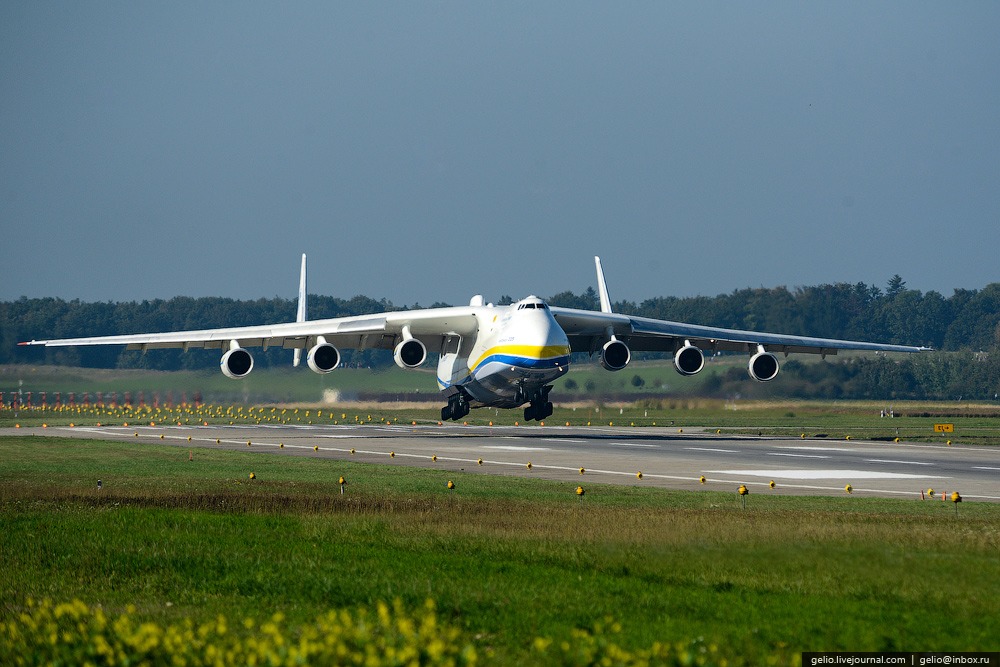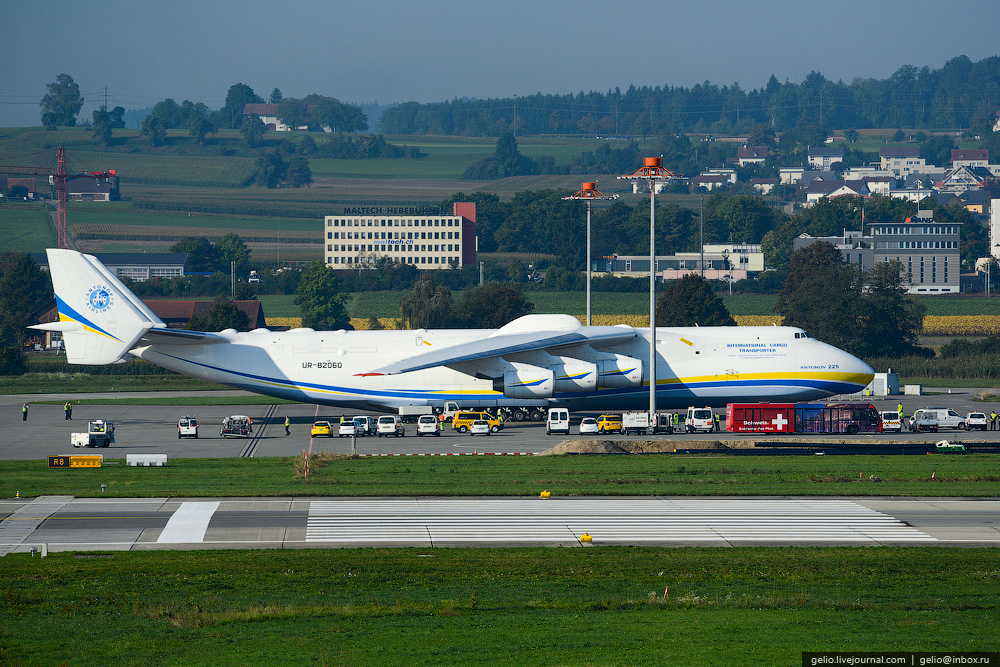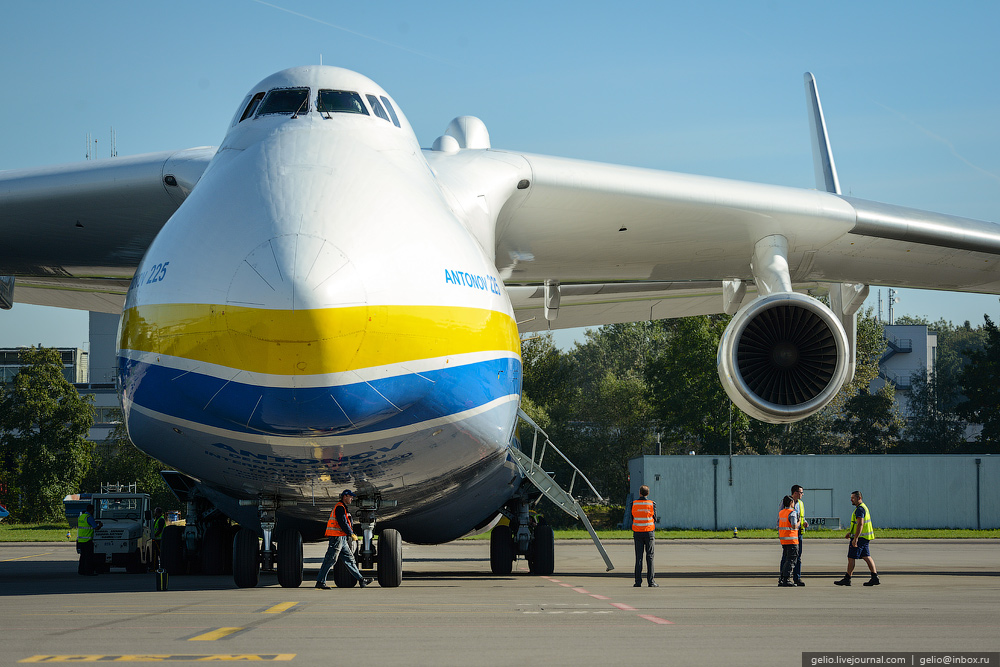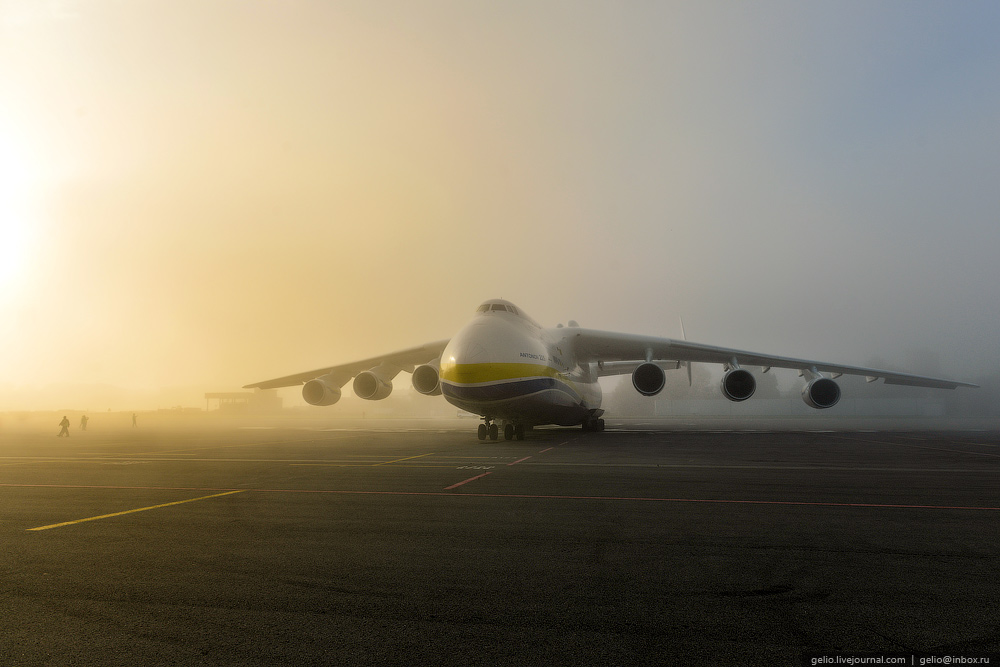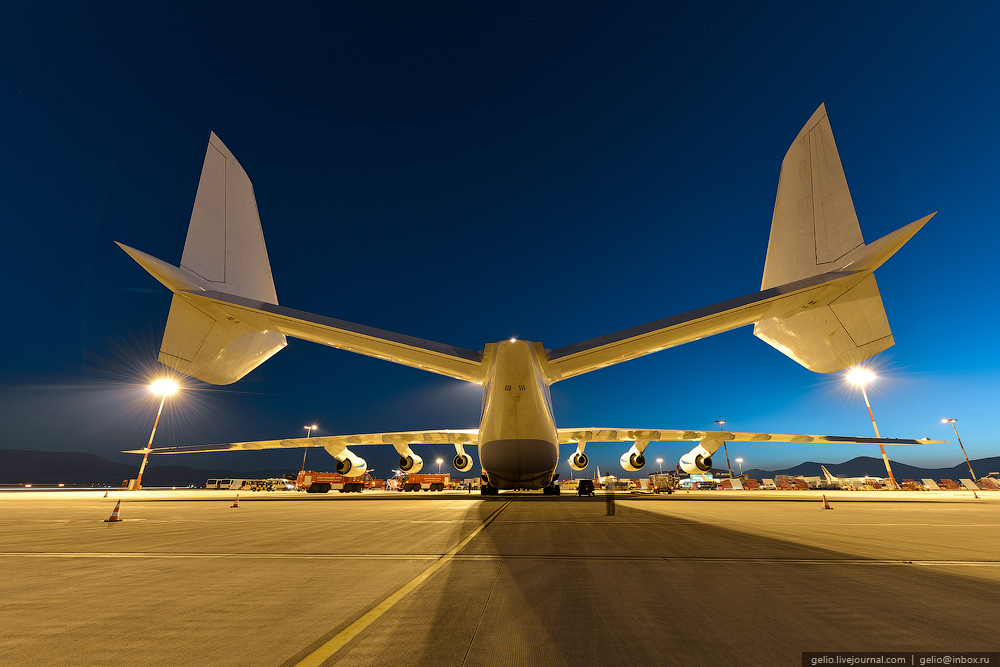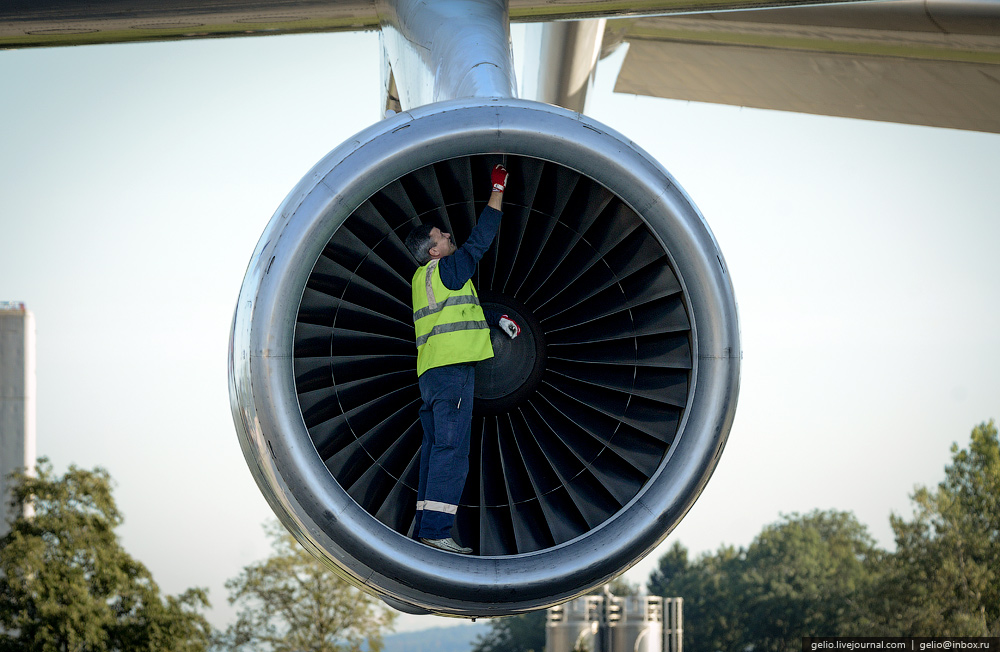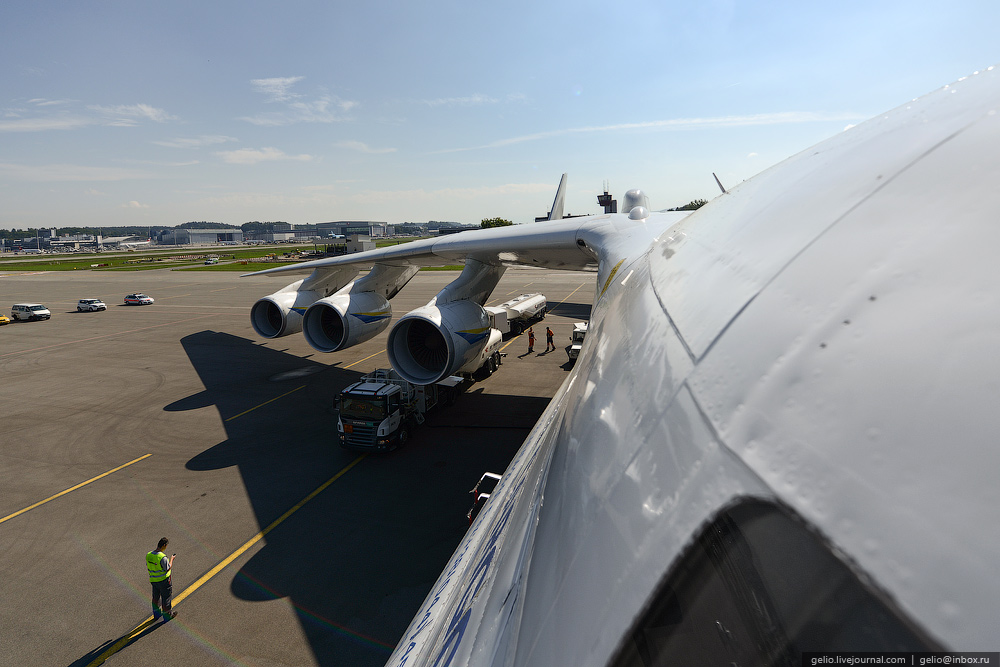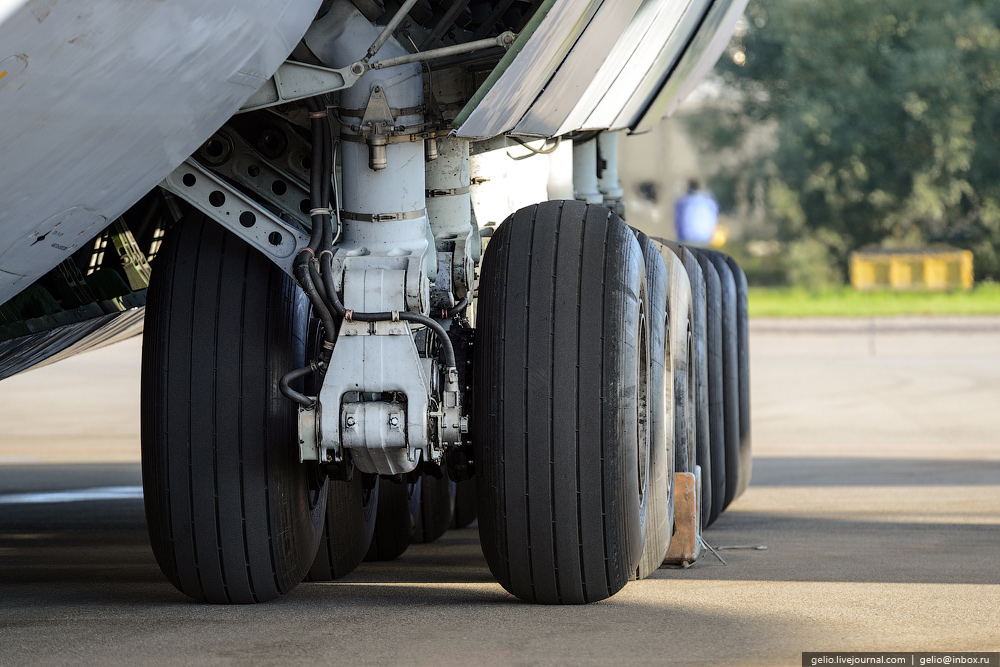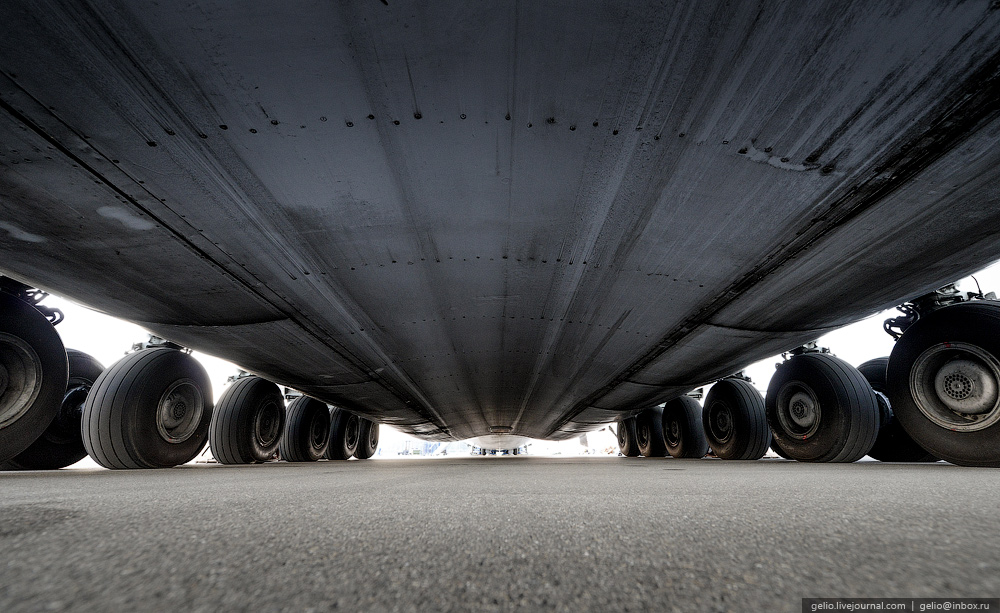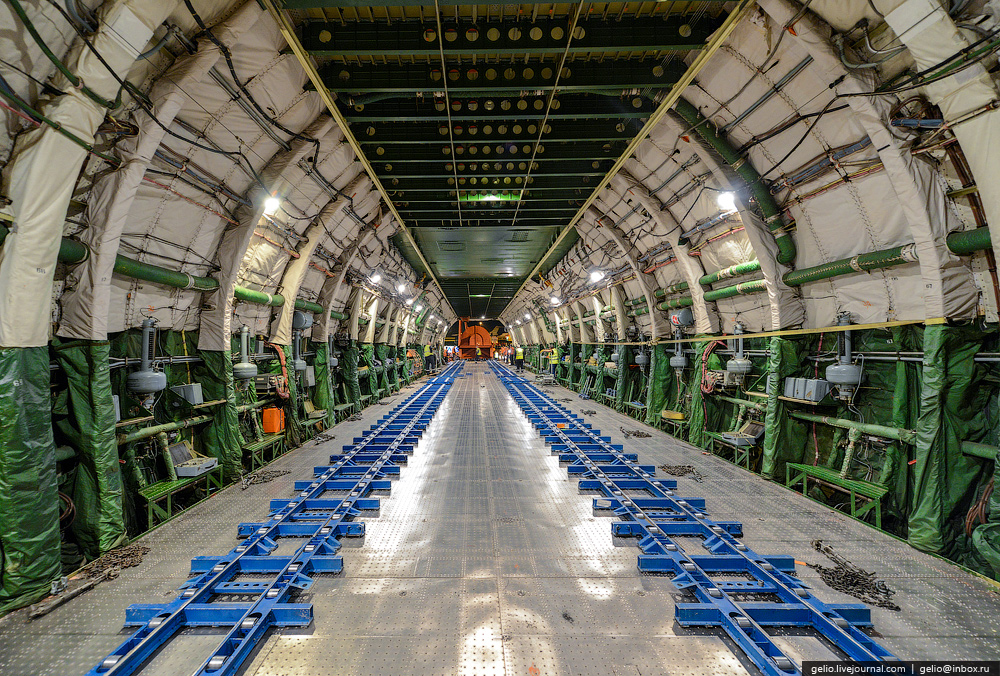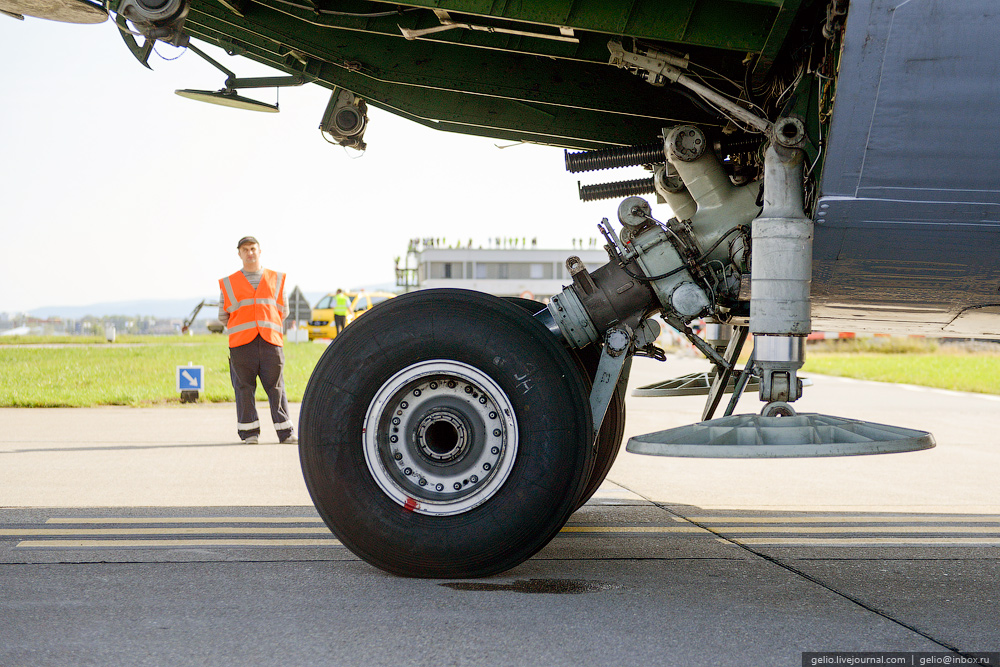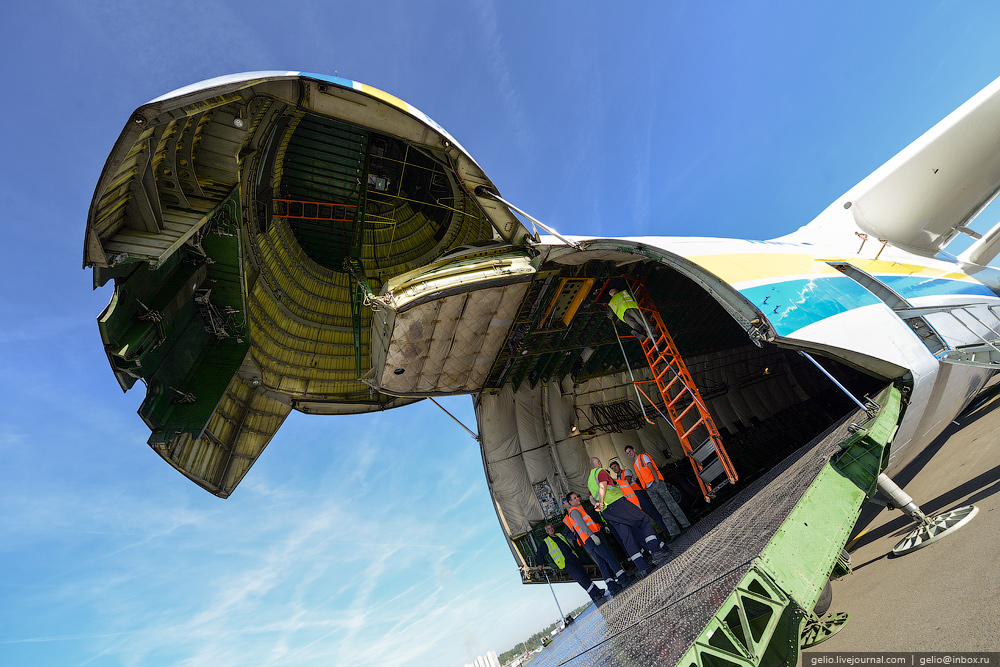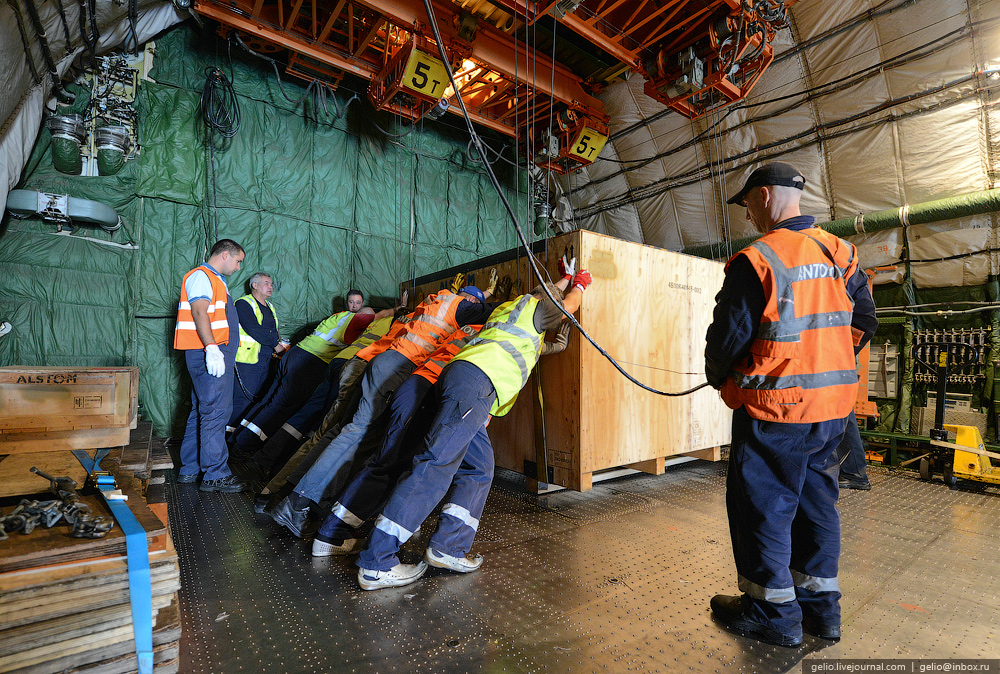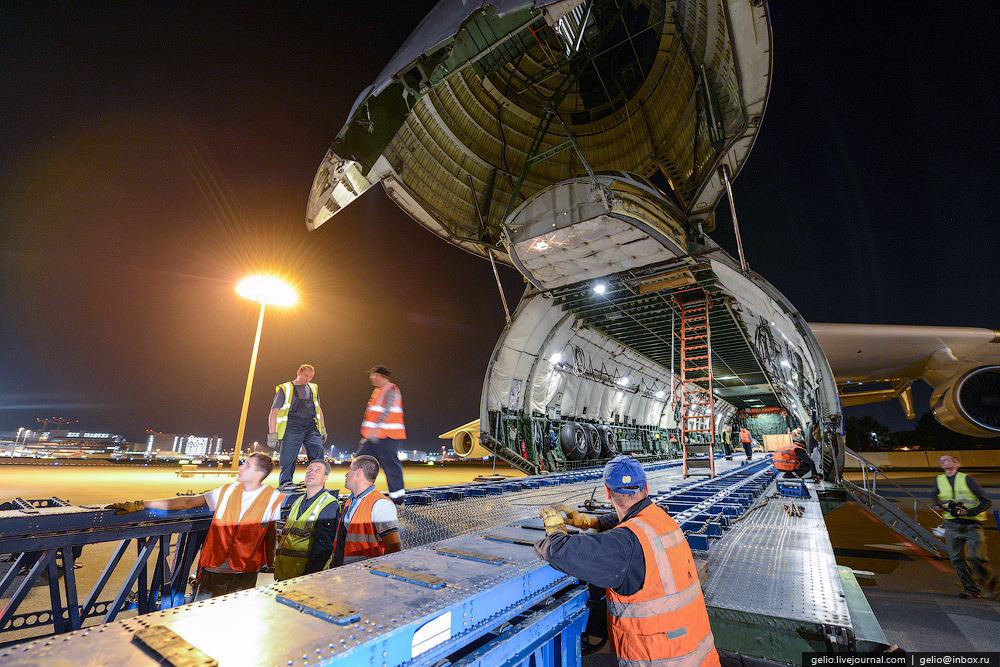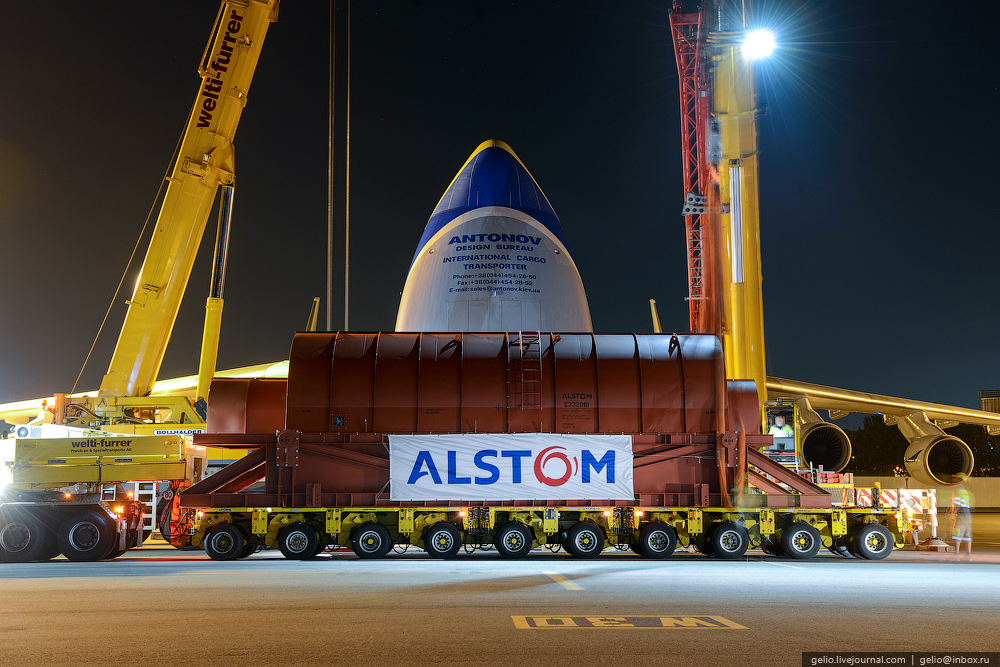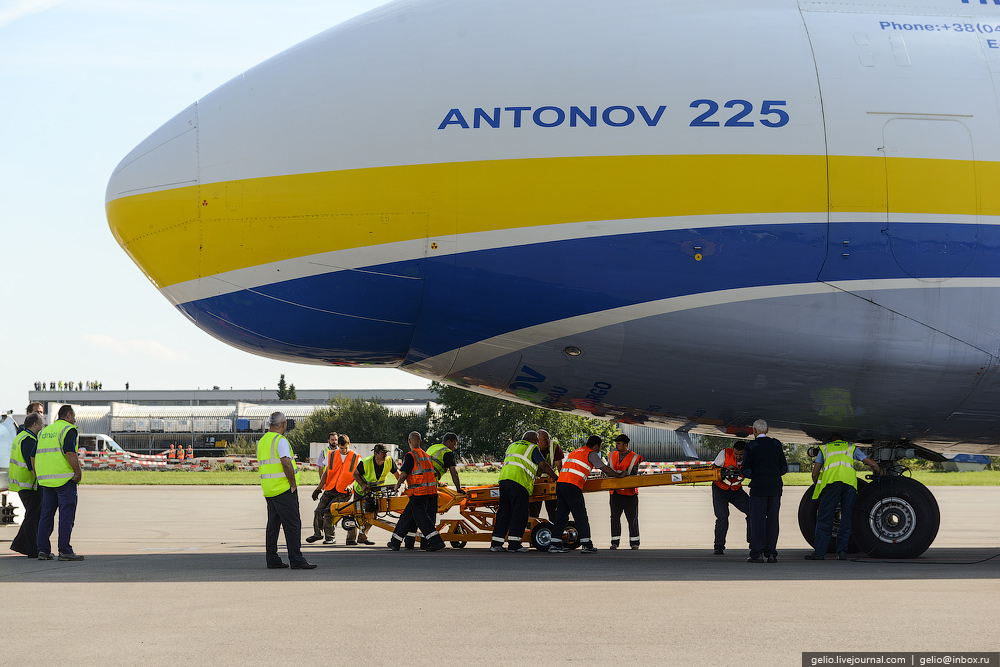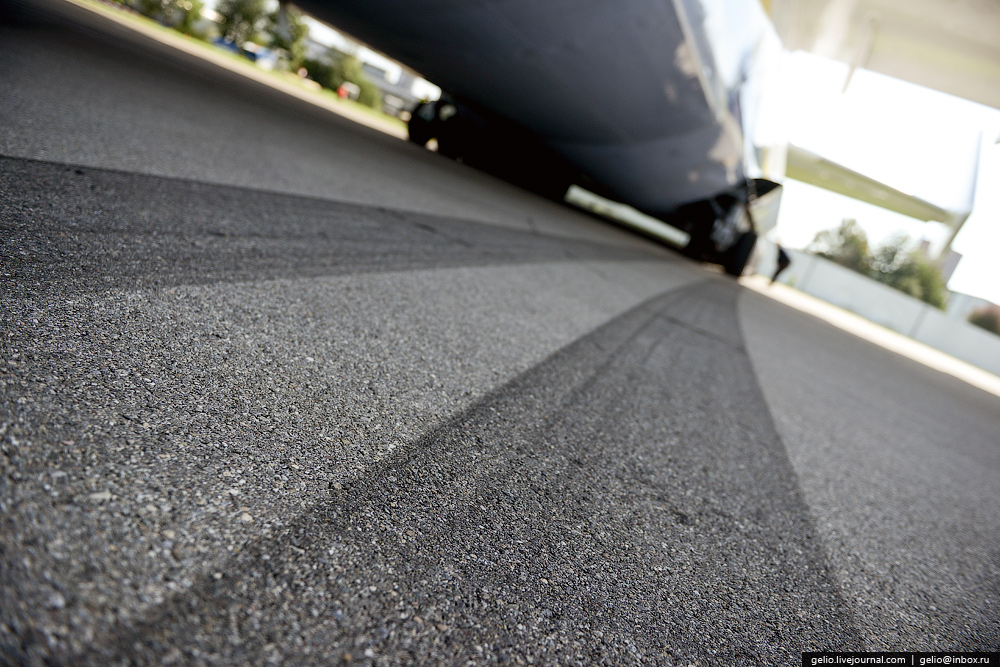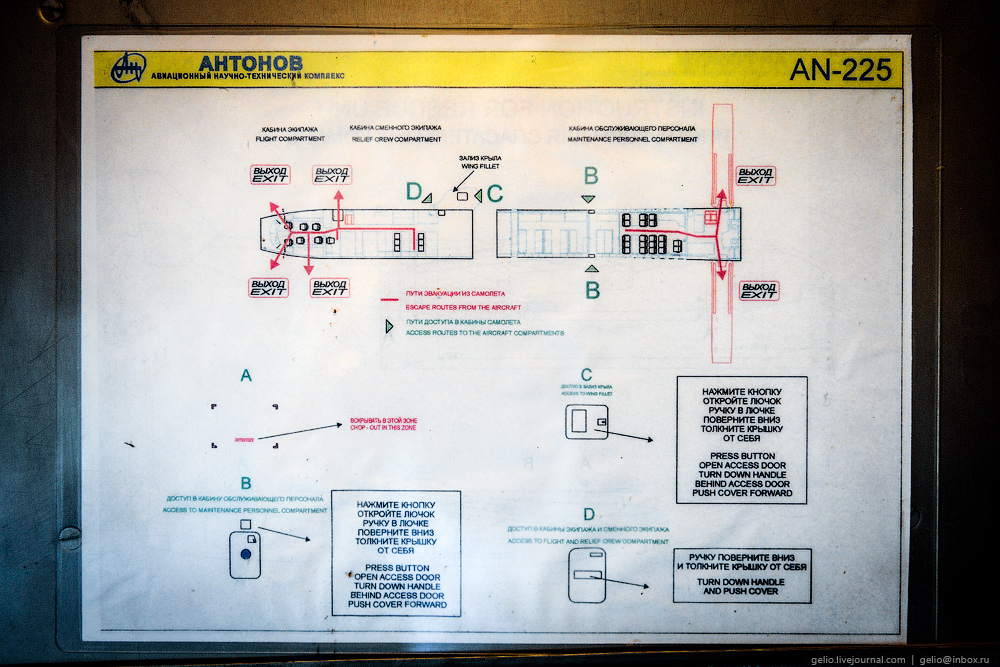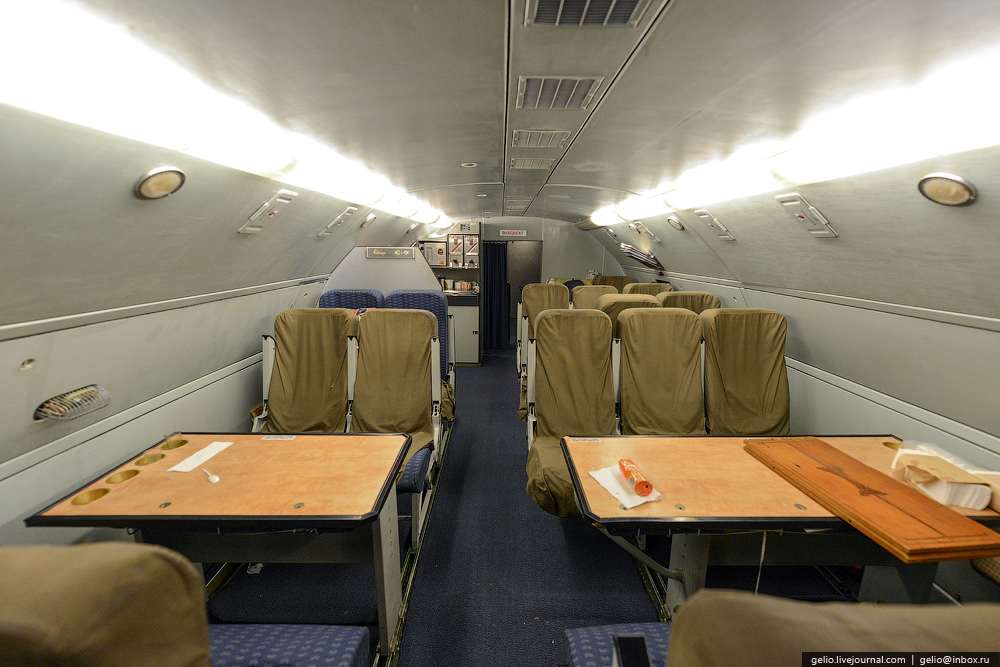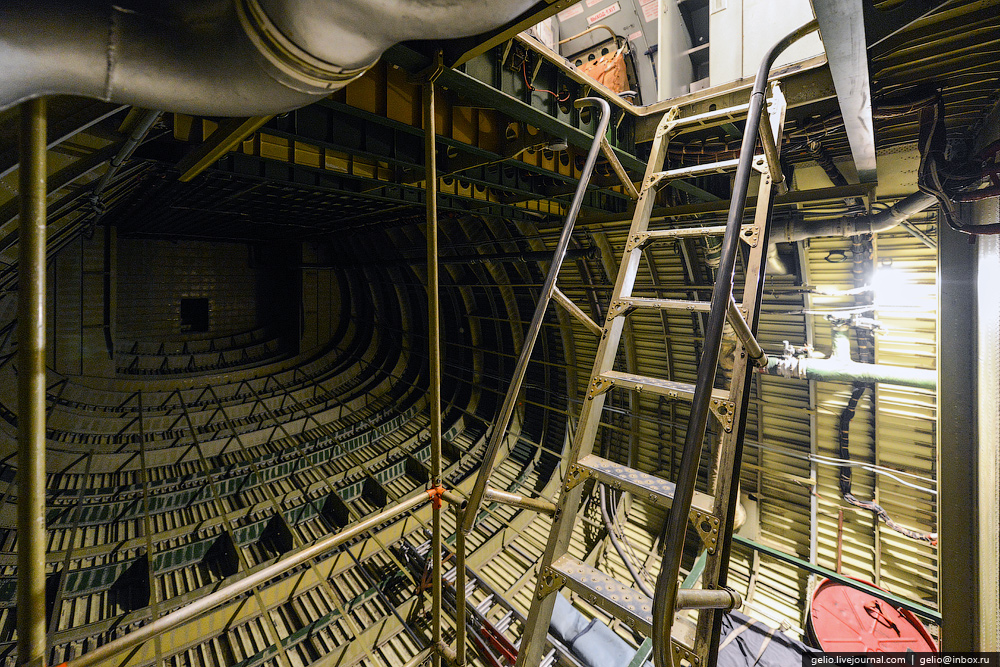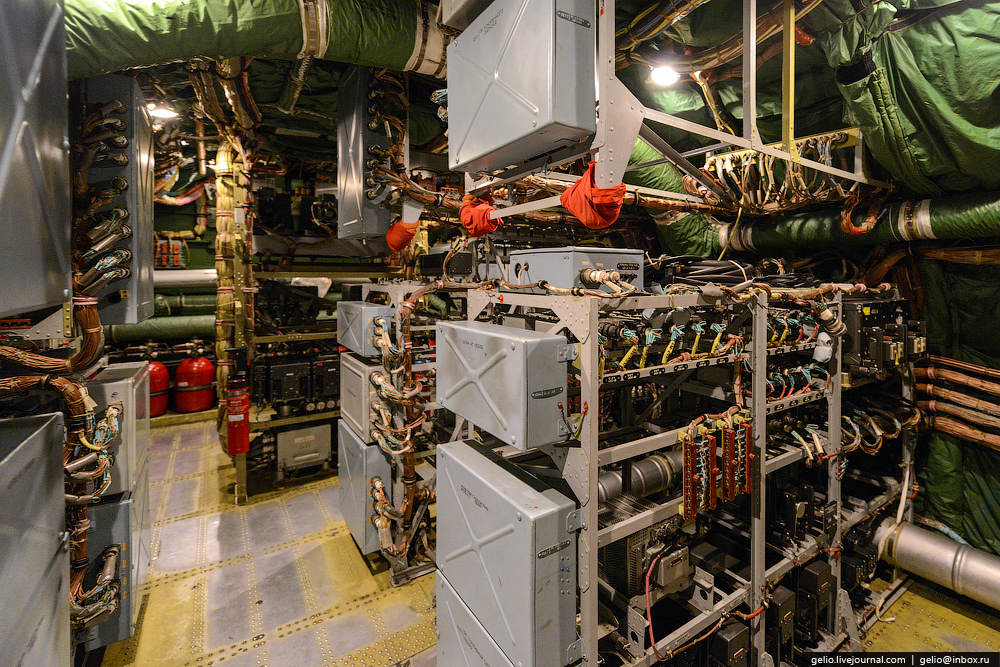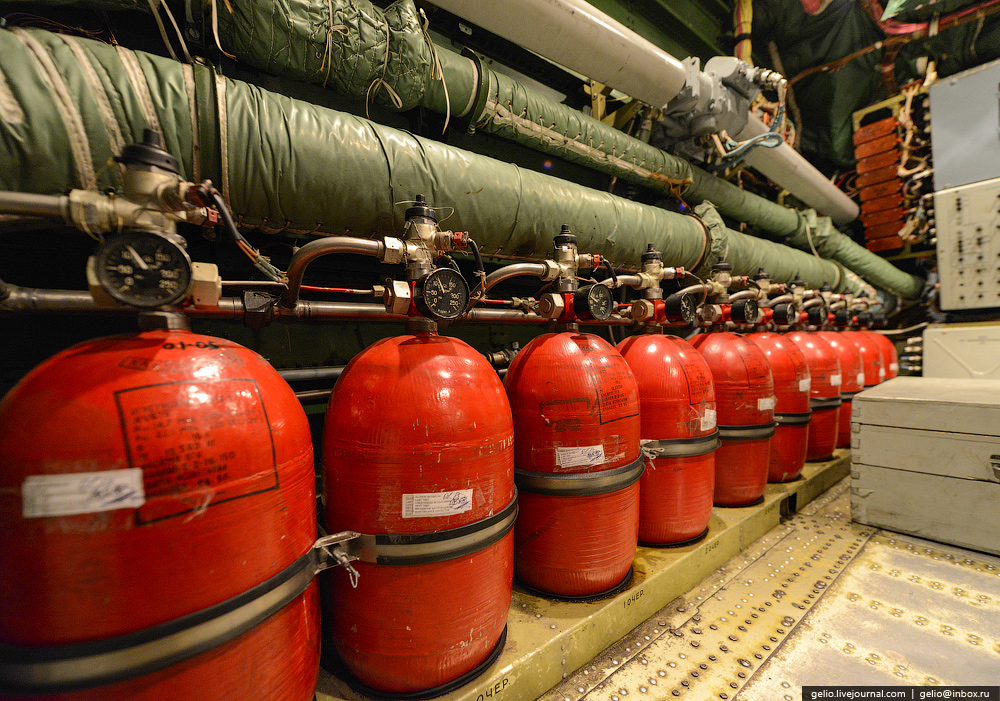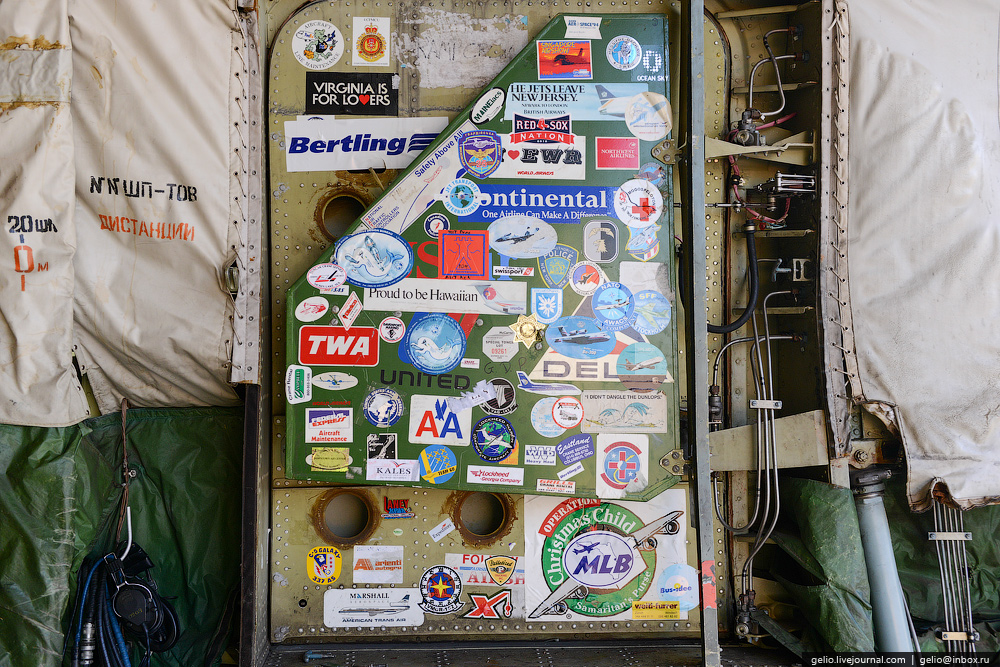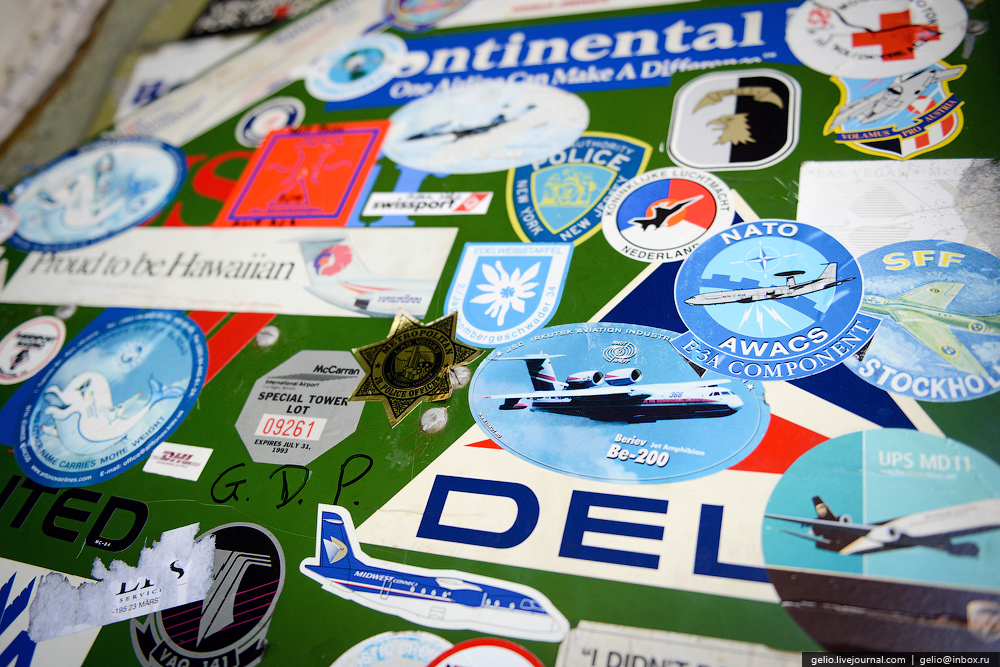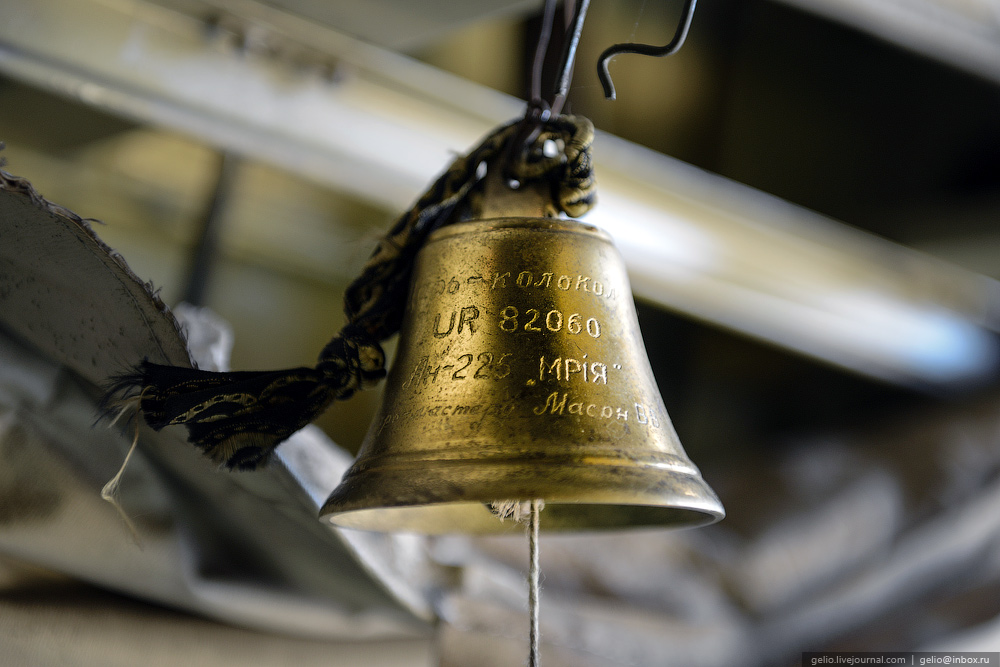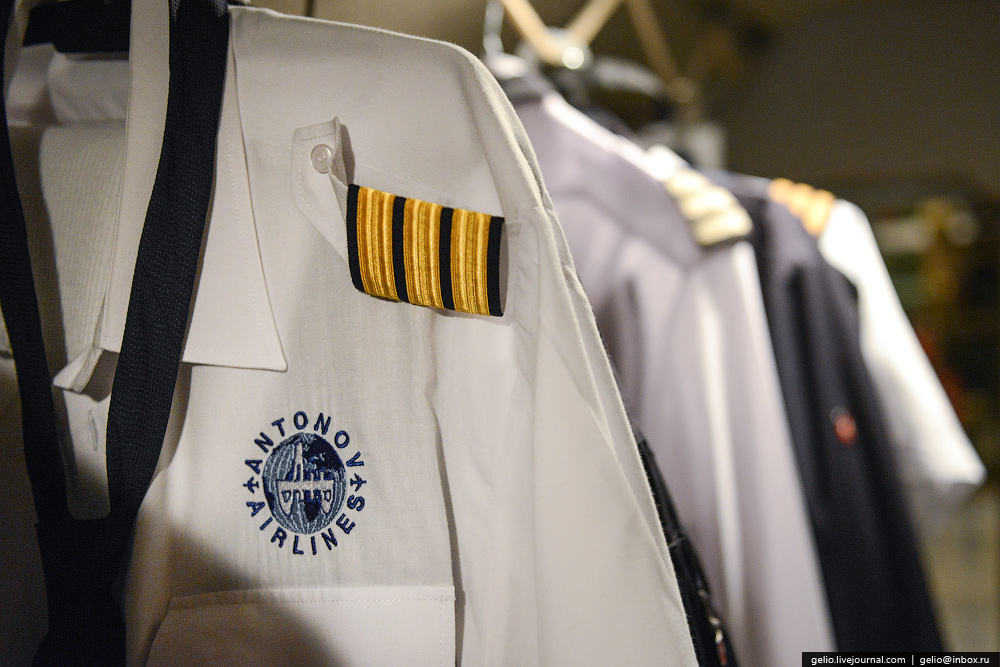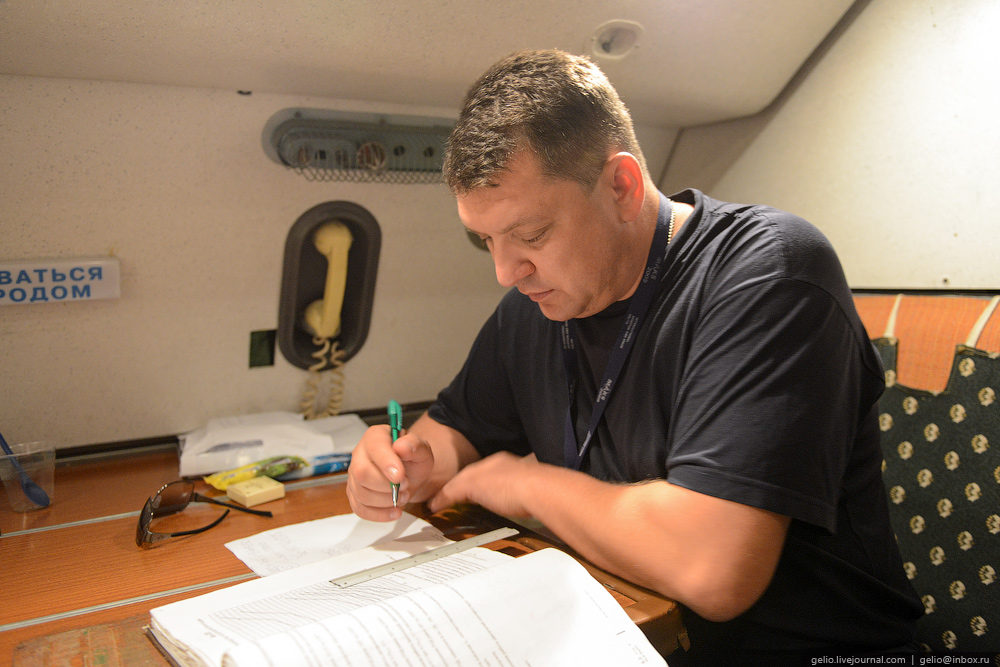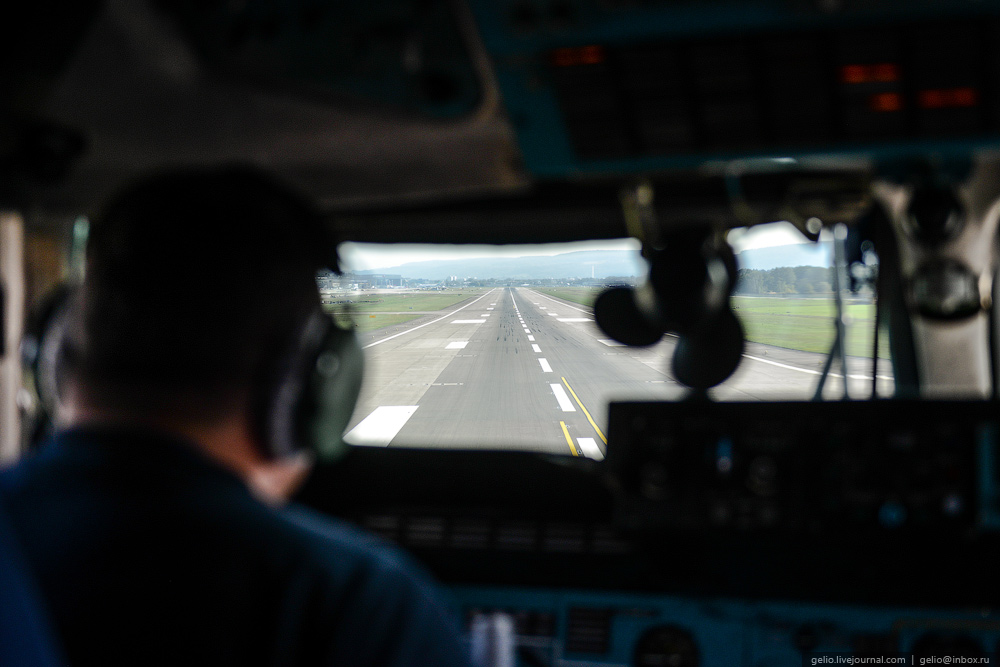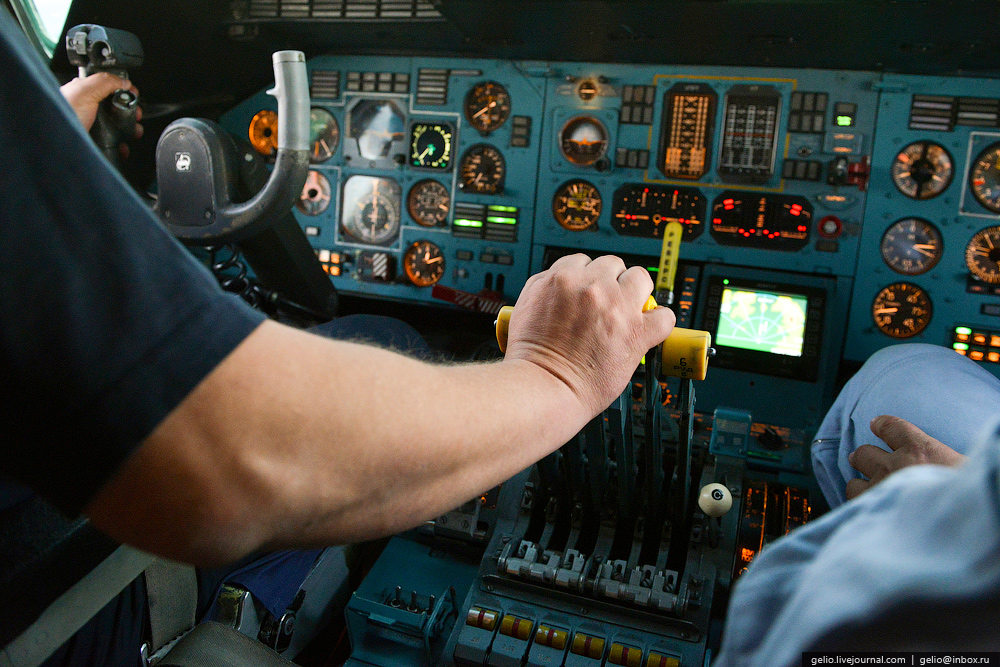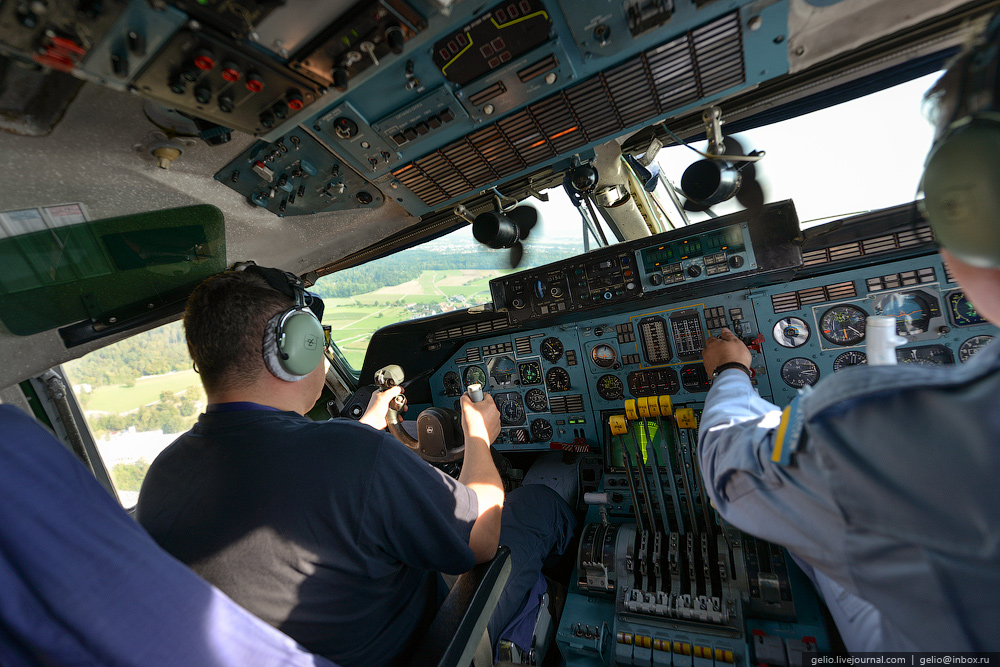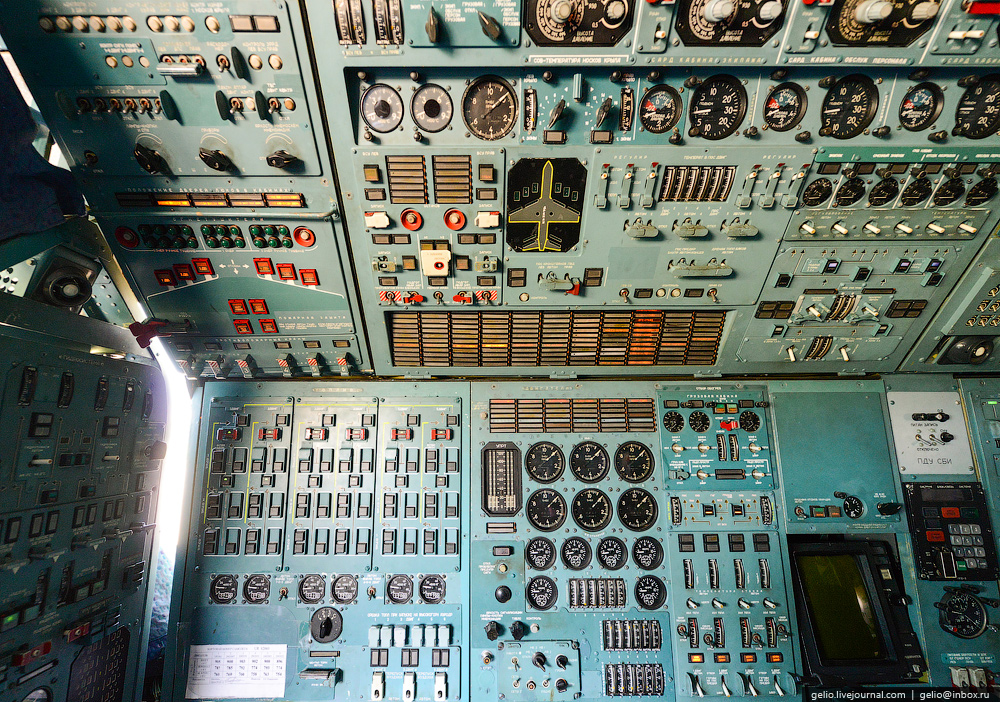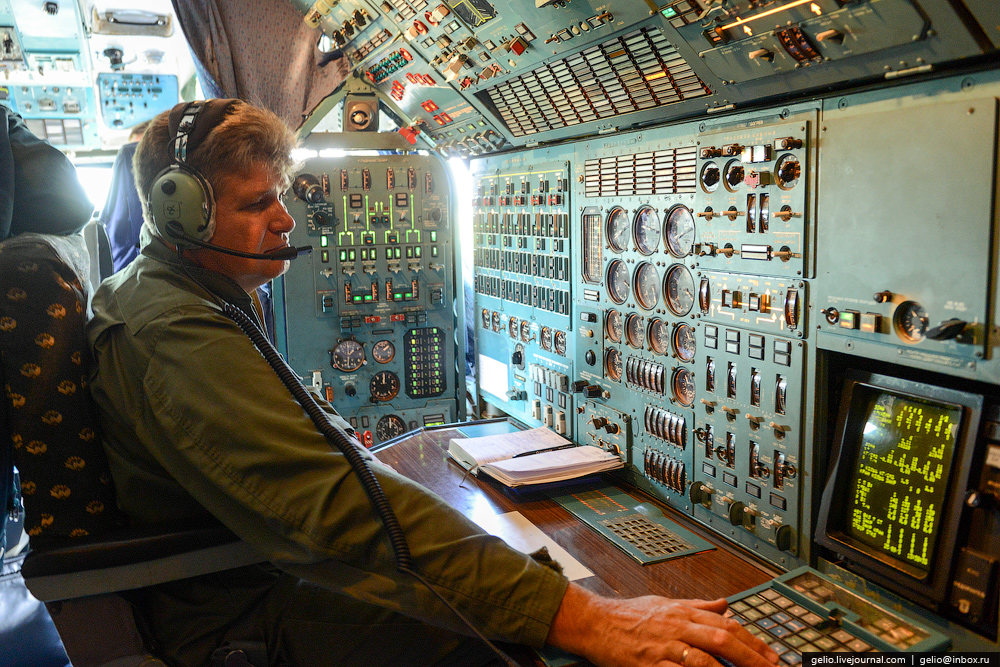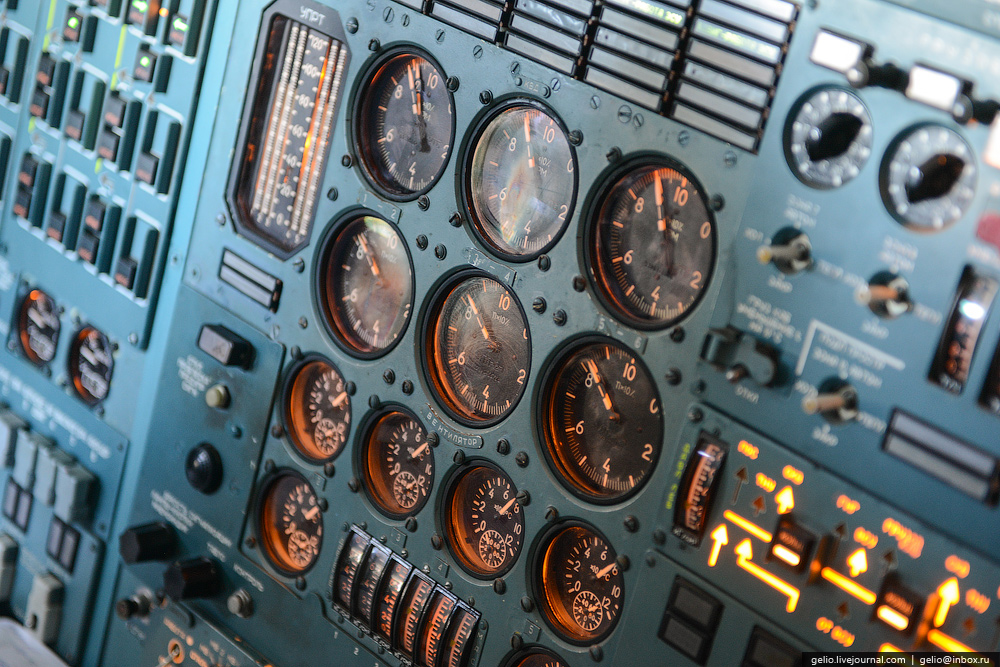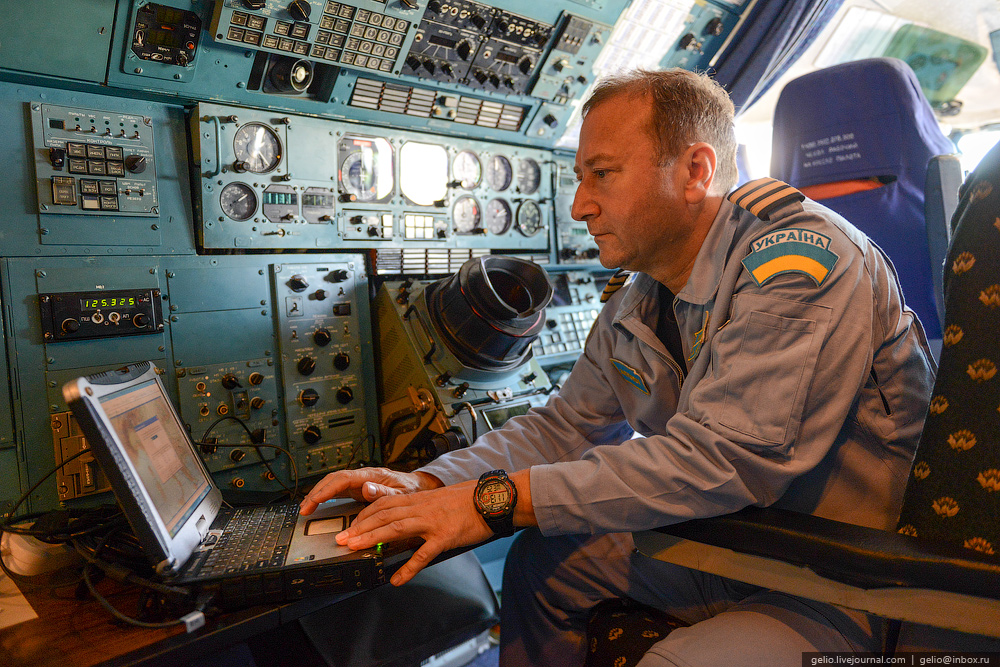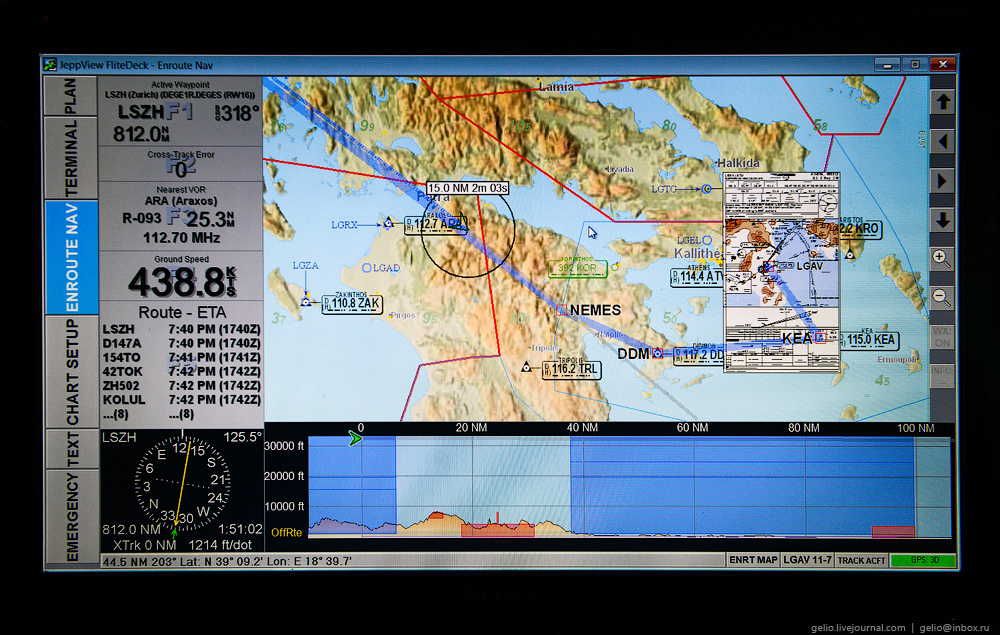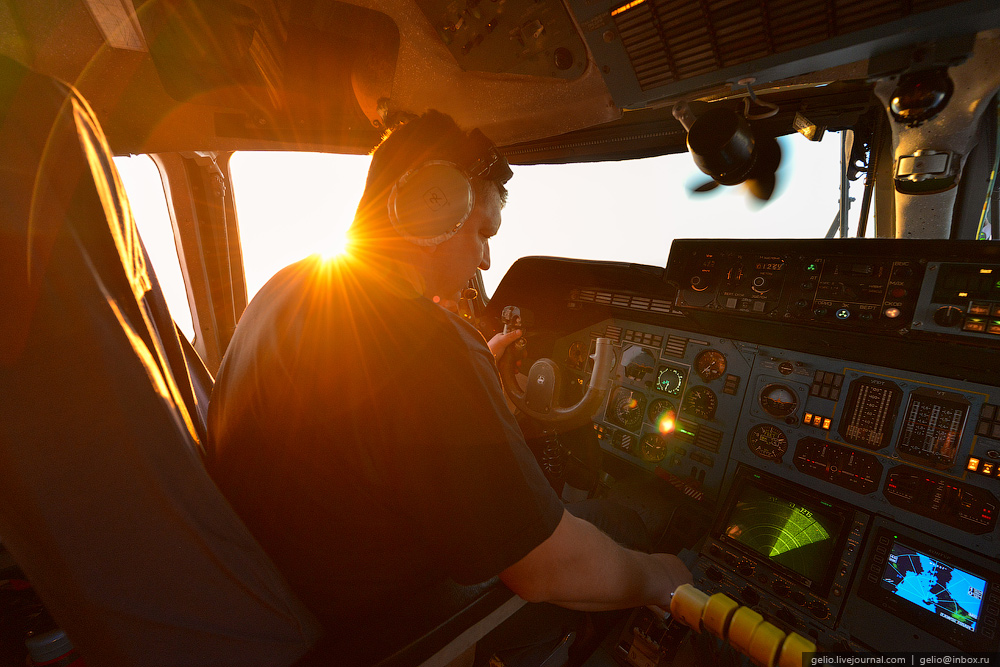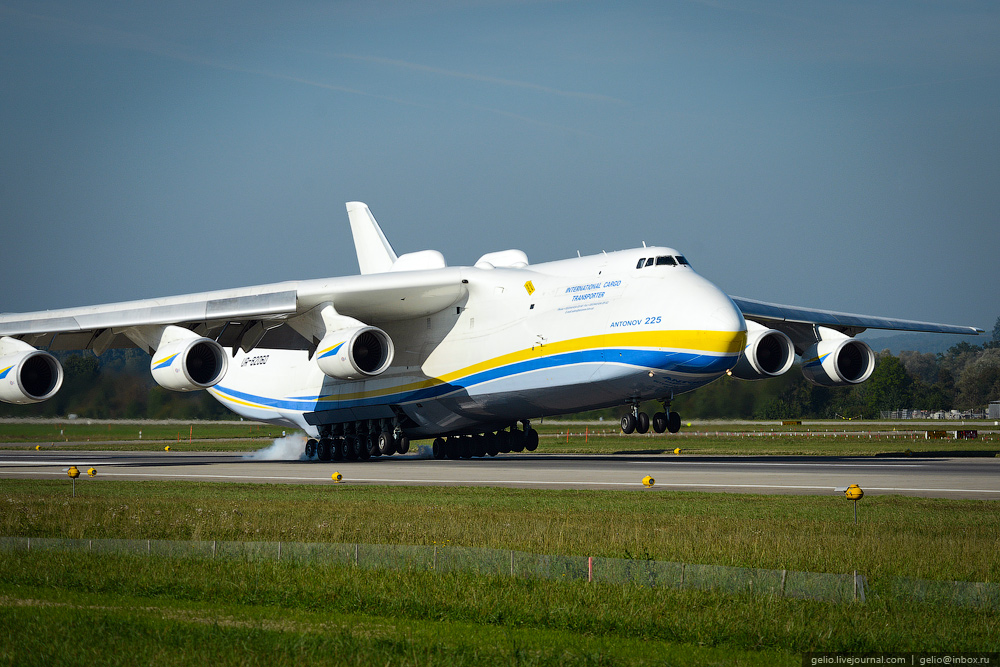
Тёрка в тагах
altai architecture arctic aviation bratsk bridge cape cherepovets chernyakhovsk construction cosmodrome elbrus energy gelio hpp icebreaker ind iran kaliningrad kamchatka komi krasnoyarsk magnitogorsk Moscow nature novosibirsk noyabrsk npp orenburg putorana salekhard samara ships space tehran tiksi ukhta vladivostok vorkuta yakutia yakutsk yamal
Большая Тёрка / Мысли / Личная лента Gelio /

Gelio

An-225 Mriya is the world’s largest aircraft (English version)
An-225 Mriya (which is referred to Dream from Ukrainian) is the heaviest airlift cargo aircraft ever taken off in the sky. The maximum takeoff weight makes 640 tons. An-225 was designed, due to the necessity to create the air transport system for the Soviet reusable Space Shuttle Buran. This is the only aircraft in the world.Читать далее
The airplane was designed in USSR and manufactured by Kiev Mechanical Plant in 1988.
Mriya has set the absolute world record of takeoff weight and an airlifted total payload.
An-225 transported a payload of 156.3 tons on March 22, 1989 which broke 110 air world records. This has become a world record in its turn.
Since its launch the aircraft has logged 3740 flying hours. If the average flight speed is equal to about 500 km per hour (taking into account takeoff, climb, cruise, descent and approach to landing), it is possible to calculate approximate kilometer performance: 500 x 3740 = 1 870 000 km. It is more than 46 circles around the Earth at the equator.
The size of An-225 is impressive. It is 84-meter long and 18-meter high (like 6-stored house with 4 porches)
The obvious comparison of Mriya and Boeing-747.
If the largest Boeing 747-800 is taken as a basis, An-225 is 8-meter longer and its wingspan is 20-meter larger.
Compared to Airbus A380, Mriya is 11-meter longer, and its wingspan exceeds by 9 meters.
Sometimes it happens that there is no appropriate parking for such a huge airplane at an airport, and it is put right on the air strip. Of course, it refers to the secondary runway if there is one at an airport.
The wingspan constitutes 88.4 m and wing area is 905 m?.
The Hughes H-4 Hercules is the only aircraft which has a greater wingspan than An-225 and is referred to the flying boats class. The airplane flew only once in 1947. The history of this aircraft is reflected in the film Aviator.
The aircraft was redesigned to fix cargo atop, as the Buran space shuttle and the Energia rocket’s boosters had the size exceeded the Mriya freight area. Besides, the aircraft was planned to be used as the first step to launch the shuttle.
The wake effect caused by oversize cargo mounted atop the aircraft required to set twin-finned tail to avoid aerodynamic shading.
The aircraft has six D-18T engines.
Every engine has the takeoff thrust of 23.4 tons (or 230 kN) meaning that the total thrust of all six engines constitutes 140.5 tons (1380kN)
It can be assumed that every engine has the takeoff power of about 12 500 hp!
An-225 has the same D-18T turbofans as An-124 Ruslan.
The height of an engine makes 3 m, width is 2.8 m and weight equals more than 4 tons.
The aircraft has automatic fly-by-wire air starting system. Auxiliary power plant consisting of two TA-12 turbofans installed in the left and right chassis fairings provides independent power to all systems and starts the engines.
Tank capacity constitutes 365 tons. Fuel is held in 13 wing integral tanks.
The aircraft can keep on flying for 18 hours and cover the distance of more than 15 000 km.
Fueling time ranges from half an hour to one-and-a half day; the number of tankers depends on their capacity (from 5 up to 50 tons), particularly, from 7 to 70 tankers.
Fuel consumption rate makes 15.9 tons per hour for a cruise flight.
When fully loaded, the aircraft can keep on flying without refueling for about 2 hours.
The chassis consists of the twin-strut nose gear and 14-strut main landing gear (7 struts on each side).
Every strut has two wheels bringing the total of 32 wheels.
Wheels should be changed every 90 landings.
The tires for Mriya are produced in Yaroslavl tyre plant. The price for one tire is equal to about $ 1000.
The wheels of the nose and main landing gear have the size of 1120 x 450 mm and 1270 x 510 mm, respectively.
Tire pressure makes 12 atmospheres.
Since 2001 An-225 has been performing commercial airlifting flights for “Antonov Airlines”.
As for the size of cargo compartment, its length is 43 m, its width is equal to 6.4 m and height is 4.4 m.
The cargo compartment is pressurized which allows transporting different types of cargo.16 standard containers, about 80 passenger cars or even large trucks like Belaz can be loaded inside the cargo compartment. There is enough space for Boeing-737 to be placed inside.
Retracting nose part of the aircraft allows easy access to the cargo compartment.
The nose ramp can be raised in 10 minutes.
The aircraft kneels to unfold the ramp which is called “Elephant’s bow”.
The nose gear leans forward, and the weight is shifted to the support gear which is installed under the doorstep of the cargo compartment.
The nose support gear.
The kneeling control panel.
This way of loading has a number of advantages, compared to Boeing-747 which is loaded through the side cargo door.
Mriya holds the absolute world record in terms of its carrying capacity: it has transported 247 tons of commercial item which is 4 times larger than Boeing-747 payload capacity, 187.6 tons of commercial single item and ultra-heavy cargo of 253.8 tons. The longest item in the history of airlifting - two blades of wind generator each of which is 42.1m long - was transported by An-225 on June 10, 2010.
To ensure the flight safety, the aircraft’s gravity center with a load must be arranged within the certain limits of its length. The load master arranges items according to the instruction. Then, the first officer checks the arrangement and reports to the captain who bears the responsibility for making a final decision about performing a flight.
The aircraft is equipped with onboard loading complex which consists of four lifting mechanisms. Every mechanism has 5 tons of carrying capacity.
Besides, there are two ground winches for loading non self-moving vehicles and cargo on loading ramp.
This time An-225 has been freighted by the French engineering company Alstom to deliver the items of 170 tons from the Swiss Zurich to Bahrain with refueling in Athens and Cairo.
These are the turbine rotor, turbo generator to produce electricity and their components.
The flight manager Vadim Nikolaevich Deniskov.
The tow bar used for other airplanes is impossible to use for towing An-225; therefore, the tow bar for the aircraft is taken onboard.
The aircraft requires full kneeling on the nose support gear to load and unload the tow bar through the nose loading door, because the aircraft is not equipped with the rear loading door. As a result, the loading time increases up to 30 minutes, and the airframe life and the kneeling system of the aircraft are unreasonably wasted.
The aircraft’s chief maintenance engineer.
The last four rows of the main landing gear are oriented to ensure the turns of the aircraft on the ground.
The maintenance engineer whose specialization is hydraulic system and chassis.
The large weight of the aircraft leads to the fact that the chassis leaves traces on asphalt.
The ladder and the door to the cockpit.
Passenger compartment is divided into two parts: flight compartment occupies the front part and maintenance and accompanying personnel compartment is in the rear part of the aircraft.
Cabin pressurization is separate; they are divided by a wing.
Maintenance compartment is designed for having meal, working with technical documents and holding a conference.
There are 18 seats for the crew and engineers which account for 6 seats in the front cabin and 12 seats in the rear part.
The ladder and access door for accompanying persons in the rear cabin.
Technical compartment is situated in the rear part of cabin crew.
On the racks there are the blocks providing the operation of different systems, pressurizing and air conditioning ducts as well as deicing systems. All systems of the aircraft are highly automatic and do not require crew intervention. Their work is provided by 34 onboard computers.
The center section front spar. The transmission of wing slats and pipelines of bleed air from the engines are installed in it (top down).
There are fixed balloons of fire-protection system with “Halon” fire extinguisher.
The labels are the souvenirs presented by numerous visitors and sticked to a side of escape hatch.
The Tahiti island, a part of the French Polynesia, is the most distant point from the base airport where the aircraft has ever performed flights to.
The distance along the shortest arc of the globe is about 16400 km.
The An-225 bell.
Vladimir Vladimirovich Mason referred to in the engraving is the aircraft maintenance engineer who was working on Mriya for a very long time.
Vladimir Yurievich Mosin is the captain of the aircraft.
The captain of An-225 must be a person who has flown on An-124 as a captain for at least 5 years beforehand.
Weight and balance control is simplified by the load measuring system mounted on the chassis frame.
The crew of the aircraft includes 6 members: captain, first officer, navigator, chief flight engineer, flight engineer of onboard equipment and radio operator.
Throttle control levers.
The aircraft is provided with remote engine control systems to reduce the force on the throttle control levers and to increase the accuracy while setting engine modes. A pilot applies relatively little efforts to move the lever of electromechanical instrument with the help of wire ropes. This instrument mounted on the engine reproduces this movement on the lever of the fuel regulator with the necessary effort and accuracy. The throttle levers of outer engines 1 and 6 are engaged with 2 and 5, respectively, for convenient operation at takeoff and landing.
A control wheel of the biggest aircraft in the world.
The aircraft control is hydraulic which means that control surfaces are deflected solely by means of hydraulic steering gear which failure makes it impossible to control the aircraft manually (with an increase of required effort). Therefore, quadruple redundancy is applied. The mechanical part of the control system (from steering wheel and pedals to the hydraulic steering gear) consists of rigid rods and wire ropes.
The aileron control system in the fuselage which is about 30 meters, each half-wing (left or right) which equals approximately 35 meters and the elevator and rudder control systems that are about 65 meters each make the total length of these ropes.
If the aircraft is unloaded, the airstrip of 2400 m is enough for takeoff and landing. 3500 m is required for takeoff and 3300 m - for landing with maximum load.
Engine warm-up which takes about 10 minutes starts at lineup.
Thus, engine stall at takeoff is avoided, and the aircraft is provided with the maximum thrust capacity of engines. Undoubtedly, this requirement leads to the fact that the aircraft takes off when an airport has minimal workload or the aircraft has to wait its turn to take off for a long time giving the way to scheduled flights.
The takeoff and landing speed depends on the weight of the aircraft and ranges from 240 km/h up to 280 km/h.
Climbing is performed at the speed of 560 km/h when the vertical velocity is 8 m/p.
At the altitude of 7100m the speed is increased up to 675 km/h climbing to flight level.
The cruise speed of An-225 is 850 km/h.
The aircraft weight and the flying range are taken into account in calculating cruise speed.
Dmitry Viktorovich Antonov is the first officer.
The central instrument panel of pilots.
The standby instruments are horizon and altitude indicators, throttle position indicator, engine thrust indicator, indicators of control surfaces and landing gear deflection (slaps, flaps and spoilers).
The instrument panel of the chief flight engineer.
There is the side panel with the control of hydraulic system and landing gear position panel in the lower left corner. The top left panel is the fire protection system of the aircraft. The top right panel with control devices contains the starter of the auxiliary power unit, pressurization, air conditioning and deicing systems and the signal board. The bottom panel has the fuel and engine control systems as well as the onboard automated monitoring system of all aircraft parameters.
Aleksander Nikolaevich Polishyuk is the chief flight engineer.
Engine control panel.
Top left is the throttle position vertical indicator. The large round instruments are engine fan and high pressure compressor indicators. The small round instruments are oil temperature indicators at the engine inlet. The block of the vertical instruments at the bottom is the oil indicator in the oil tanks of the engine.
The flight engineer’s control panel of onboard equipment.
Here are the instruments for monitoring the power supply system and the aircraft oxygen system.
Anatoly Binyatovich Abdullaev is the navigator.
The flight over the territory of Greece.
Yaroslav Ivanovich Koshitsky is the instructor navigator.
Gennady Yurievich Antipov is the radio operator.
The call sign of the International Civil Aviation Organization (ICAO) for An-225 on the route Zurich – Athens is ADB-3038.
Yury Anatolievich Mindar is the flight engineer.
The air strip of the airport in Athens.
Mriya performs instrument landing at night and visual from flare-out altitude to landing. According to the crew, landing in Kabul is the most difficult one which is connected with highlands and numerous obstacles. Landing approach starts at the speed of 340 km/h down to 200 m, then the aircraft gradually drops the speed.
The aircraft performs flapless landing at 295 km/h. Runway touchdown at the vertical speed of 6 m/s is allowed. After touchdown, a thrust reverser is deployed from the engines 2 to 5 immediately, and 1 and 6 engines are left idling. The aircraft slowdowns at 140-150 km/h up to full stop.
The lifespan of the airplane is 8000 flying hours, 2000 takeoff-landings or 25 calendar years.
The aircraft can perform flights up to December 21, 2013. It is the 25th anniversary of the aircraft since its setting in operation. Then, the aircraft will be carried out the detailed investigation of its technical conditions and necessary services to extend the aircraft’s lifespan up to 45 years.
Due to high air transportation costs by An-225, the orders appear only for very long or ultra-heavy load, when carrying by ground transport is impossible. Flights are random and occur from 2-3 times a month up to 1-2 times a year. Sometimes the construction of the second An-225 is discussed, but for this purpose corresponding order and financing are required. About $ 90 million is necessary to complete the construction of the aircraft. Taking into account the aircraft testing costs, this sum increases up to $ 120 million.
Perhaps, this aircraft is one of the most beautiful and impressive airplanes in the world.
Thanks to “Antonov Airlines” for the help in organizing photography!
Напомню, что русскоязычная версия этого поста находится здесь: http://gelio.livejournal.com/191632.html
- 1 комментарий










